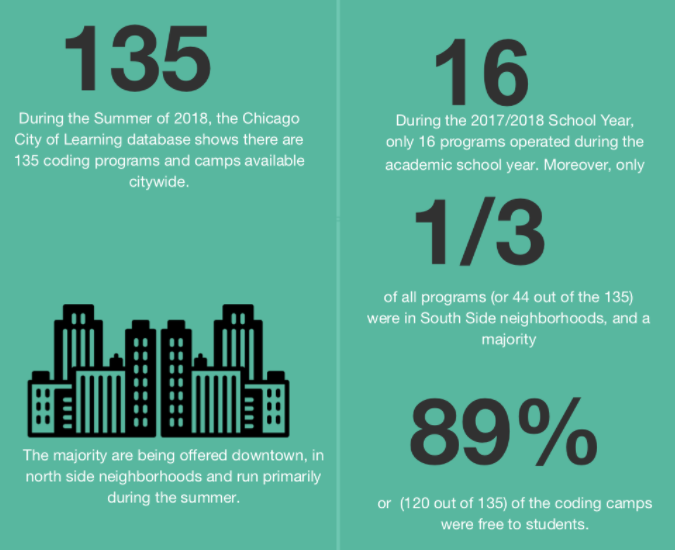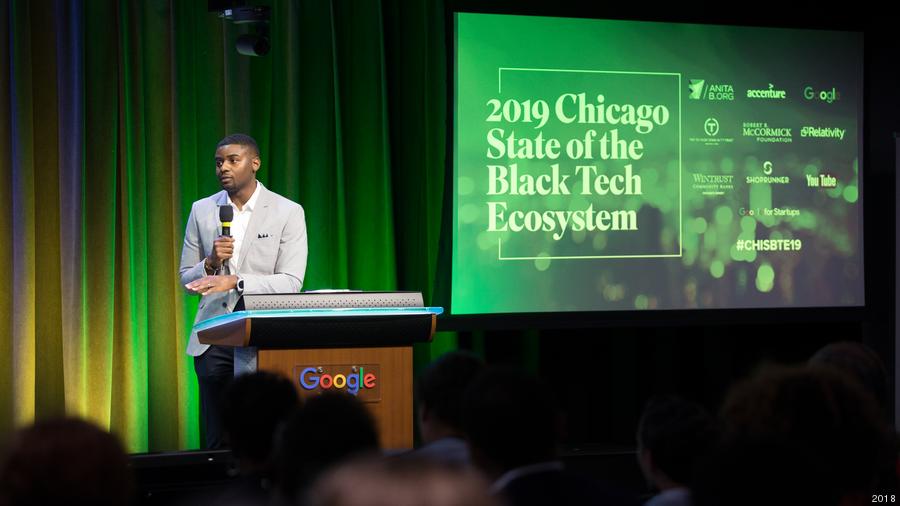Increasing diversity remains a top issue for many startups. But new data shows black people are still few and far between in Chicago tech positions, and even more scarce among management roles.
Black Tech Mecca, a Chicago think tank that researches racial disparities in the local tech industry, released a new report last week at an event at Google Chicago that discussed the state of diversity in Chicago’s tech industry. The report included data on Illinois’ tech workforce, as well as the educational and STEM opportunities available to Chicago’s youth that play a role in propelling them into tech careers.
Chicago’s demographics are nearly equal parts white (32.6 percent), black (29.3 percent) and Latinx (29.7 percent), the report shows. But racial disparities in the tech industry, and across the business sector in general, continue to be a problem.
BTM’s report found that there is just one black manager for every 100 tech workers in Illinois, whereas the ratio is much smaller for white managers. On average, there is one white manager for every three tech workers.
When looking specifically at black women, the disparity is even larger. For every 151 tech workers in Illinois, there is only one black woman in senior leadership. Among white women, it’s one for every 10 workers, a finding that was especially surprising to Fabian Elliott, the co-founder and CEO of Black Tech Mecca, and a technical solutions consultant at Google Chicago.
“I wasn’t expecting it to be a 15-fold difference,” Elliott said. “That was really shocking to me on how important it is for us to look at intersectionality, and look at not only race, but gender and sexual orientation, and find out what these experiences are for folks that have multiple affiliations.”
According to a previous BTM report released last year, of the 378,000 people who work in a tech job in the Chicagoland region, only 40,000, or 9 percent, of them are black. When it comes to tech founders and entrepreneurs in the area, only 2 percent are black.
Of the Chicago tech companies included in BTM’s most recent report, only 24 percent reported that black employees made up at least 15 percent of their staff.
The reasons why there are fewer black workers in the tech industry in Chicago and across the country are related to a number of different factors, but Elliott said that in Chicago, public education can play a large role in rectifying the issue.
In Chicago Public Schools, black students are struggling to pass standardized tests. During the 2015-2016 academic year, only 19 percent of black fourth grade students were demonstrating proficiency in mathematics on tests, compared to 59 percent of white students, according to BTM’s report. And when it comes to CPS high school seniors, only 6 percent of black students showed proficiency in science, compared to 29 percent of their white counterparts.

However, some encouraging findings show that the number of black students who enrolled in advanced placement (AP) computer science courses increased from 2,708 in 2016-2017 to 4,475 in 2018-2019. BTM attributes the growth in part to CPS’ new Computer Science for All program, which was launched in 2011.
“Chicago is a national leader in this space. It was the very first school system to get this [program] passed,” Elliott said. “They’re getting proven results, but they still need more resources to be able to reach all the different schools and pay teachers that can teach the CS classes.”
Additionally, more community STEM resources have become available in recent years. BTM’s report shows that of the 135 coding and gaming learning programs available in Chicago, 44 of them were in South Side neighborhoods as of 2017. However, many of them are only offered during the summer.
“Kids get really engaged and then they’re out of luck during the school year,” Elliott said.
When it comes to higher education, the report shows that only 12 percent of black undergraduates in Illinois graduate with a STEM or computer science degrees.
Beyond educational resources, startup incubators and accelerators, which many entrepreneurs rely on to get their businesses up and running, are mainly located in non-black neighborhoods. Black Tech Mecca’s report found that of the 32 incubators and accelerators in the Chicago, only seven were physically located within five miles of predominantly black Chicago neighborhoods.
With all the educational and economic factors at play, the picture is clear that black tech professionals have a much harder time entering the workforce than their white counterparts. Tech companies are aware of the disadvantages potential black talent faces and many, including some in Chicago, have pledged to prioritize diversifying their teams. But sometimes, there still aren’t significant improvements in workplace demographics, Elliott said.
“Most [tech companies] have formal commitments to diversity and inclusion…however, when we start to dig a bit deeper, they have that overarching language, but not many of them have some of the supporting best practices that are at play,” he said.
For example, some best practices to combat hiring biases include maintaining an apprenticeship or mentorship program to recruit minority candidates. But BTM’s report shows that only 38 percent of tech companies in its study had a program like this. Other best practices include blind recruitment, which requires taking names off resumes before they are reviewed.
“Even if they have these commitments, if they’re not implementing some of these proven national best practices, then no one is going to see the results we’re hoping to see,” Elliott said.
